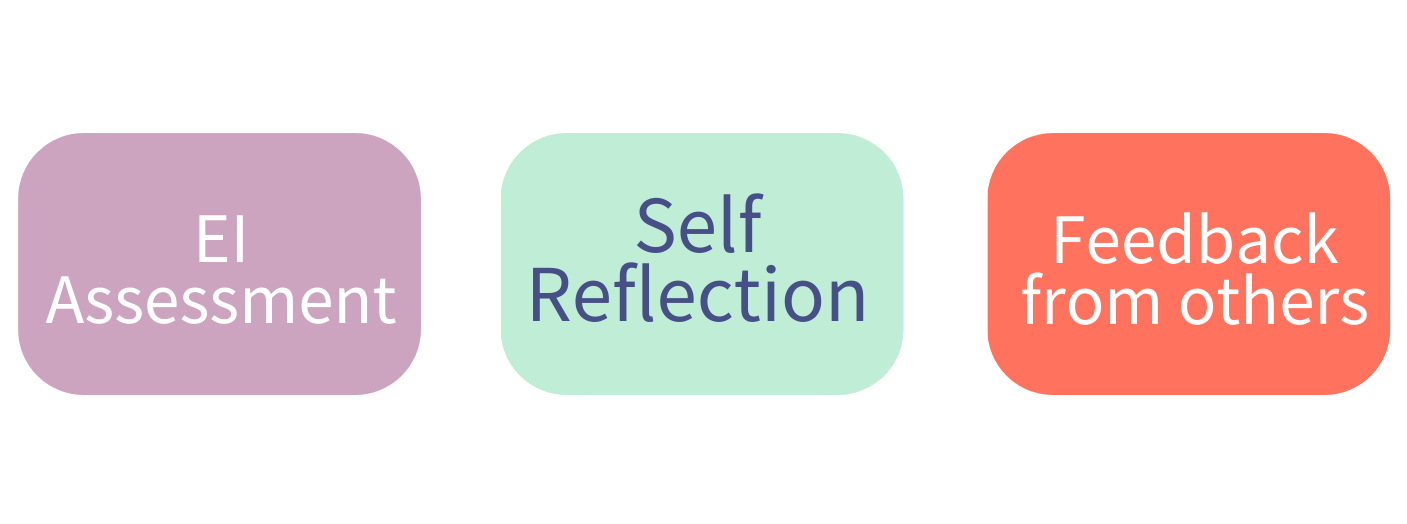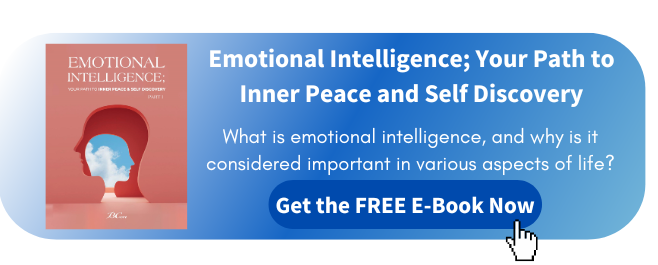Assess Your Emotional Intelligence
Where do You Stand?
To improve Emotional Intelligence, we need to assess where we currently are. There are three ways to help you assess your Emotional Intelligence:

Tool 1: Emotional Intelligence Assessments1
According to Harvard Business Review, there are the three recommended free EI assessments:
1. Psychology Today
For almost 50 years, this publication has been assisting in our understanding of what makes individuals "tick." The test is thorough and includes several question types to guarantee the validity of the evaluation. It takes roughly 45 minutes to finish.
2. Mind Tools
This one is simple and quick, but it will give you a general idea of your EI.
3. Institute for Health and Human Potential
This research firm is committed to assisting businesses in utilizing Emotional Intelligence research. They thoroughly understand what it takes to operate well under pressure.
Further suggested Emotional Intelligence free assessments2:
4. Global Leadership Foundation
The Global Emotional Intelligence Test uses 40 questions which are derived from the Global EI Capability Assessment instrument, which contains 158 items. These are based on Goleman's four-quadrant Emotional Intelligence Competency Model.
Tool 2: Self-Reflection
"Pay attention to your patterns. The way you learnt to survive may not be the way you want to continue to live. Heal and Shift."
- Thelma Bryant Davis
To Personally answer an Emotional Intelligence test is definitely of great value. At least it measures how people see themselves. Yet, tests as a stand-alone tool is not enough. In the end, tests have the limitation of telling us about ourselves within a set of specific questions. In addition, we might fall into the trap of over or underestimating ourselves. We can know much more about ourselves and where we stand through self-reflection.
Eight Tips for Self-Reflection3:
1. Make a promise to be honest with yourself. Self-reflection uncovers many things about ourselves. Some of which might be pleasant, while others will require self-acceptance. Being honest with oneself is crucial to make self-reflection derive the required benefits.
2. Prepare a situation that might help you with reflection. Ask yourself questions such as:
- What happened?
- How did I feel? Why?
- How did I react? Why?
- Would I do the same reaction next time?
3. Prepare questions to aid you with the process:
- Am I maintaining Emotional Intelligence with my team?
- Am I communicating as clearly and concisely as I think?
- Am I getting stressed over things I can't control?
4. Book a meeting with yourself for self-reflection daily; 15 to 30 minutes daily is enough and will help you yield good results.
5. Choose a place where you can sit comfortably and feel relaxed. Adjust the lighting and seating to help you have an enjoyable time.
6. Observe behavior patterns: As you continue your self-reflection, you might start noticing patterns. Everybody is a creature of habit. Both useful and unhelpful habits can be found among them. To actively diminish the behaviors you don't want and reinforce the ones you want, it helps to be conscious of your habits.
7. Keep track of your self-reflections: Keep your dates and timings in your journal so you can check your patterns and progress.
8. Forgive Yourself: Old habits are difficult to break, and change is difficult. When you don't get things right, be kind to yourself. It's alright. All of us are human. Everybody makes errors.
Tool 3: Feedback From Others
"It takes humility to seek feedback. It takes wisdom to understand it, analyze it, and appropriately act on it."
- Stephen Covey
Ask your boss, coworkers, friends, or family how they would grade your Emotional Intelligence to check your self-perception. Ask them, for instance, how you handle disagreement, how adaptable or empathic you are, or how you handle challenging situations. Even if it might not always be what you want to hear, it's usually what you need to hear.4
A practical and easy way is to choose people you trust and ask them to log in to the Emotional Intelligence survey you took earlier. Ask them to do it according to how they perceive you. Compare answers about how you perceive yourself and how each one of them perceives you. In the end, ask yourself questions such as:
- To what percentage is my self-perception identical to how others perceive me?
- In What areas are my perception of others and myself the closest?
- In What areas are the perception of others and my perception of myself the most different?
- Where are the most discrepancies?
- Where are the most similarities?
- What do the numbers tell you about yourself?
The more your perception of yourself and how others perceive you are identical, the more authentic you are.
You can utilize the table below to help you
(Download the Emotional Intelligence Competency worksheet to help you using the form on the bottom of this page.)
Self-Awareness: a self-aware person can objectively interpret their actions, feelings, and thoughts.
Self-Regulation: a self-regulated person can understand and manage their behaviour and reactions to feelings and things happening around them.
Self-Motivation: a self-motivated person can empower themselves, are committed towards their goals, are personally driven, can deal with setbacks, and have a good sense of optimism.
Empathy: An empath can see and feel from another person's perspective.
Effective relationships: This means the person can interact successfully with others, exchange constructive feedback, build trust, and express himself clearly, and objectively.
1 HBR, 18 Nov 2016, Harvard Professional Development, Assessing your Emotional Intelligence: 4 Tools we Love, accessed 22 Jan 2023, https://professional.dce.harvard.edu/blog/assessing-your-emotional-intelligence-4-tools-we-love/
2 Virtual Speech, 21 September 2018, Tom Jager, Emotional Intelligence-What is it and why is it important for your business? Accessed 22 Jan 2023, https://virtualspeech.com/blog/importance-emotional-intelligence-workplace>
3 USC Price, 24 Apr 2018, 3 Simple Ways to Practice Self-reflection, Accessed 6 Nov 2022, https://eml.usc.edu/blog/practice-self-reflection
Healthy Place, 13 Dec 2016, Silke Morin, Five Tips on Self Reflection for personal growth, Accessed 6 Nov 2022, https://www.healthyplace.com/blogs/livingablissfullife/2016/12/self-reflection-a-valuable-tool-for-personal-growth
From Awareness to Action, BCON Ebook November Edition 2022
4 Harvard Professional Development, 26 Aug 2019, How to Improve you Emotional Intelligence, Accessed 22 Jan 2023, https://professional.dce.harvard.edu/blog/how-to-improve-your-emotional-intelligence/
5BetterUp, 14 Sep 2022, Meredith Betz, What is Self-Awareness and Why is it Important, Accessed 14 Feb 2023, https://www.betterup.com/blog/what-is-self awareness
6Accessed 14 Feb 2023, https://raisingchildren.net.au/toddlers/behaviour/understanding-behaviour/self-regulation
For more about this topic, download our latest book " Emotional Intelligence: Your Path to Inner Peace and Self Discovery" for FREE:
